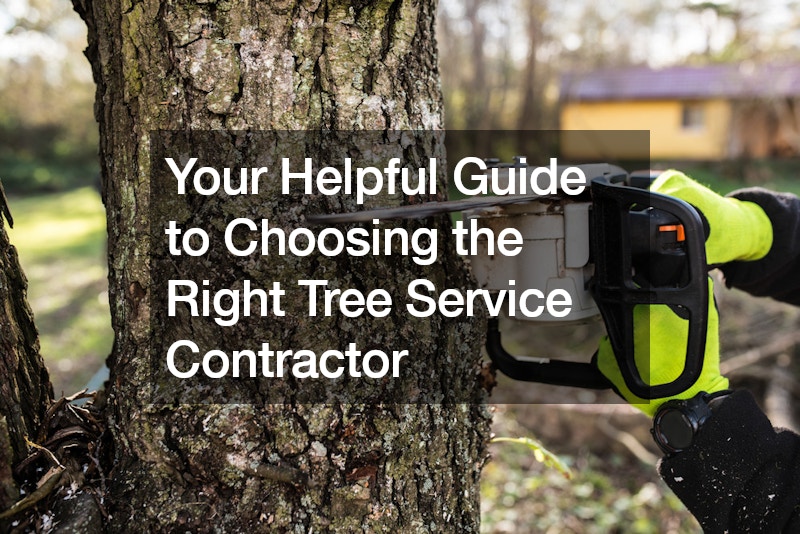When it comes to maintaining the health and beauty of your trees, hiring a reputable local tree service contractor is essential. Whether you need tree trimming, tree removal, or emergency tree service, choosing the right professional can make a world of difference in the outcome of your project. In this comprehensive guide, we will walk you through everything you need to know about selecting the best tree service contractor for your needs.
1. What services do tree care contractors offer?
Tree service contractors offer a wide range of services to help maintain the health and appearance of your trees. From tree trimming to tree removal service, these professionals have the skills and expertise to handle all your tree care needs. Tree trimming is essential for promoting healthy growth and ensuring the safety of your property. Tree removal is necessary for eliminating dead or hazardous trees that pose a risk to your home or landscape.
Local tree removal services are also offered by tree care contractors, providing a safe and efficient way to remove unwanted trees from your property. Whether you need tree cutting services for cosmetic reasons or to address a potential hazard, a tree service contractor can help you achieve your goals.
When looking for a tree care contractor, be sure to inquire about all the services they offer to ensure they can meet your specific needs. Whether you need routine tree maintenance or emergency tree service, choosing a contractor with a wide range of services is key to maintaining the health and beauty of your trees.
2. How can I verify the credentials of a tree contractor?
Before hiring a tree service contractor, it’s important to verify their credentials to ensure they are qualified to perform the job. One of the first things you should do is check for proper licensing. A reputable contractor will have the necessary licenses and permits to operate legally in your area.
In addition to licensing, you should also look for certifications and insurance when vetting a potential tree removal company. Certification from organizations such as the International Society of Arboriculture (ISA) demonstrates that a contractor has the knowledge and skills to provide quality tree care services. Insurance is also essential, as it protects you and the contractor in the event of any accidents or damage during the project.
3. What should I consider when comparing different tree care contractors?
When comparing different tree care contractors, there are several factors to consider to ensure you choose the right professional for your needs. One of the most important things to look for is experience and expertise. A tree care contractor with years of experience and a proven track record of success is more likely to deliver high-quality results.
Customer reviews and testimonials are also important when evaluating tree care contractors. Reading reviews from past clients can give you insight into the contractor’s reputation and the quality of their work. Look for contractors with positive reviews and testimonials to ensure you are working with a trusted and reliable professional.

4. How can I get an accurate estimate from a tree care contractor?
Getting an accurate estimate from a tree care contractor is crucial for budgeting and planning purposes. One of the best ways to ensure you receive an accurate estimate is to request a site visit. A reputable tree care contractor will visit your property to assess the scope of the project and provide a detailed estimate based on their findings.
During the site visit, the contractor should take into account factors such as the size and condition of the trees, the complexity of the job, and any specific requests or concerns you may have. By conducting a thorough site visit, the contractor can provide an estimate that reflects the true cost of the project and prevents any surprises down the line.
5. What safety measures should tree care contractors follow?
Tree service contractors should prioritize safety above all else when performing tree care services. Proper use of safety equipment is essential to prevent accidents and injuries on the job. A reputable contractor will ensure that their team is equipped with the necessary safety gear, such as helmets, gloves, and harnesses, to protect themselves and your property.
In addition to safety equipment, tree care contractors should also adhere to industry standards and best practices when completing tree care projects. Following established safety guidelines helps to minimize risks and ensure the safety of everyone involved in the project. Contractors who prioritize safety demonstrate their commitment to professionalism and quality work.
6. What are common red flags to watch out for when hiring a tree care contractor?
When hiring a tree care contractor, it’s important to be aware of common red flags that may indicate a less-than-reputable professional. One red flag to watch out for is a lack of insurance or licensing. Contractors who are not properly licensed or insured may not have the necessary qualifications or protections to perform the job safely and effectively.
Another red flag to be wary of is an unwillingness to provide references. Reputable tree care contractors are proud of their work and happy to share references from satisfied clients. If a contractor refuses to provide references or has negative reviews from past clients, it may be a sign that they are not the right choice for your tree care needs.
7. How long does it typically take for a tree care contractor to complete a job?
The timeline for completing a tree care project can vary depending on several factors, including the size and complexity of the job, the number of trees involved, and the availability of the contractor. Factors that affect the timeline also include the weather conditions, access to the trees, and any additional services required, such as stump removal or debris cleanup.
Clear communication and expectations are key to ensuring that the project stays on track and is completed in a timely manner. Before work begins, discuss the timeline with the contractor and establish a realistic schedule for the project. By setting clear expectations and maintaining open communication throughout the process, you can help ensure that the job is completed efficiently and to your satisfaction.

8. What payment options are typically accepted by tree service contractors?
Tree care contractors typically accept a variety of payment options to accommodate their clients’ needs. Payment schedules and methods can vary depending on the contractor, so it’s important to discuss these details upfront before signing a contract. Most contractors will require a deposit or down payment before work begins, with the remaining balance due upon completion of the project.
Accepted payment methods may include cash, check, credit card, or online payment platforms. Be sure to clarify the preferred payment method with the contractor and establish a payment schedule that works for both parties. It’s also important to get everything in writing, including payment terms and any agreed-upon changes to the contract, to avoid any disputes or misunderstandings later on.
9. How can I assess the quality of work done by a tree care contractor?
Assessing the quality of work done by a tree care contractor is essential to ensure that your trees are properly cared for and that the job meets your expectations. One way to assess the quality of work is to inspect completed projects. Take a close look at the trees that were trimmed or removed and assess the overall appearance and health of the trees.
Another way to evaluate the quality of work is to ask for before and after photos of the project. Many tree care contractors keep a portfolio of their past work, including photos of trees before and after they were serviced. Reviewing these photos can give you a better sense of the contractor’s capabilities and the results they can achieve.
10. What should I do if I’m not satisfied with the work of a tree care contractor?
If you are not satisfied with the work of a tree contractor, it’s important to address your concerns promptly and seek resolution. The first step is to contact the contractor directly to discuss the issues and try to come to a resolution. Be specific about your concerns and provide any documentation or evidence to support your claims.
If direct communication with the contractor does not lead to a satisfactory resolution, you may need to seek arbitration or legal means to resolve the dispute. Depending on the terms of your contract and the nature of the issue, arbitration or legal action may be necessary to recoup any losses or damages and hold the contractor accountable for their work.
11. Can tree contractors provide emergency services?
Tree service contractors are equipped to provide emergency services for situations that require immediate attention. Whether a tree has fallen on your property, a branch is threatening to damage your home, or a tree is posing a safety hazard, emergency tree contractors can respond quickly to address the issue and prevent further damage.
Availability for urgent situations is critical when it comes to emergency tree services. Reputable contractors will have a team on standby to respond to emergency calls and deploy the necessary equipment and personnel to resolve the issue promptly. Response time is also important, as delays in addressing emergency situations can result in additional damage or safety risks.

12. How can I maintain the health of my trees after hiring a tree service contractor?
After hiring a tree care contractor to care for your trees, it’s important to continue maintaining their health to ensure they thrive for years to come. Regular pruning and maintenance are essential for promoting healthy growth and preventing disease or pest infestations. A tree trimmer can help you develop a maintenance schedule that meets the needs of your trees and keeps them looking their best.
By following these maintenance tips and staying vigilant about the health of your trees, you can ensure that they remain strong and vibrant for years to come. A healthy tree not only adds beauty to your landscape but also provides numerous benefits, such as shade, oxygen production, and wildlife habitat.
13. Are there any industry certifications or affiliations that indicate a reputable tree contractor?
Industry certifications and affiliations can help you identify a reputable tree service contractor who meets high standards of professionalism and quality. One of the most recognized certifications in the tree care industry is ISA certification, which indicates that a contractor has the knowledge and skills to provide expert tree care services. Contractors who hold ISA certification have demonstrated a commitment to ongoing education and best practices in tree care.
Membership in professional associations, such as the Tree Care Industry Association (TCIA) or the National Arborists Association (NAA), can also indicate that tree companies are dedicated to upholding industry standards and ethics. Affiliation with these organizations demonstrates a commitment to professionalism, safety, and quality workmanship, making them valuable indicators of a reputable contractor.
14. What environmental considerations should I keep in mind when hiring a tree contractor?
When hiring a tree contractor, it’s important to consider the environmental impact of the work being done and take steps to minimize any negative effects on the surrounding ecosystem. Proper disposal of tree debris is one environmental consideration to keep in mind. A reputable contractor will dispose of tree waste responsibly, either by recycling it or disposing of it in an environmentally friendly manner.

15. How can I leave feedback or reviews for a tree care contractor?
Leaving feedback or reviews for a tree care contractor is a great way to share your experience with others and help potential clients make informed decisions. There are several ways to leave feedback, including online review platforms, social media, and direct communication with the contractor. Online review platforms, such as Google My Business or Yelp, allow you to rate and review the contractor based on your experience.
Direct communication with the contractor is another option for leaving feedback. Whether you want to praise their work, provide constructive criticism, or suggest improvements, reaching out to the contractor directly can help them understand your perspective and make any necessary adjustments. Open and honest feedback is essential for continuous improvement and growth.
Choosing the right tree service contractor is essential for maintaining the health and beauty of your trees. By following the guidelines outlined in this comprehensive guide, you can make an informed decision and select a contractor who meets your needs and exceeds your expectations.




